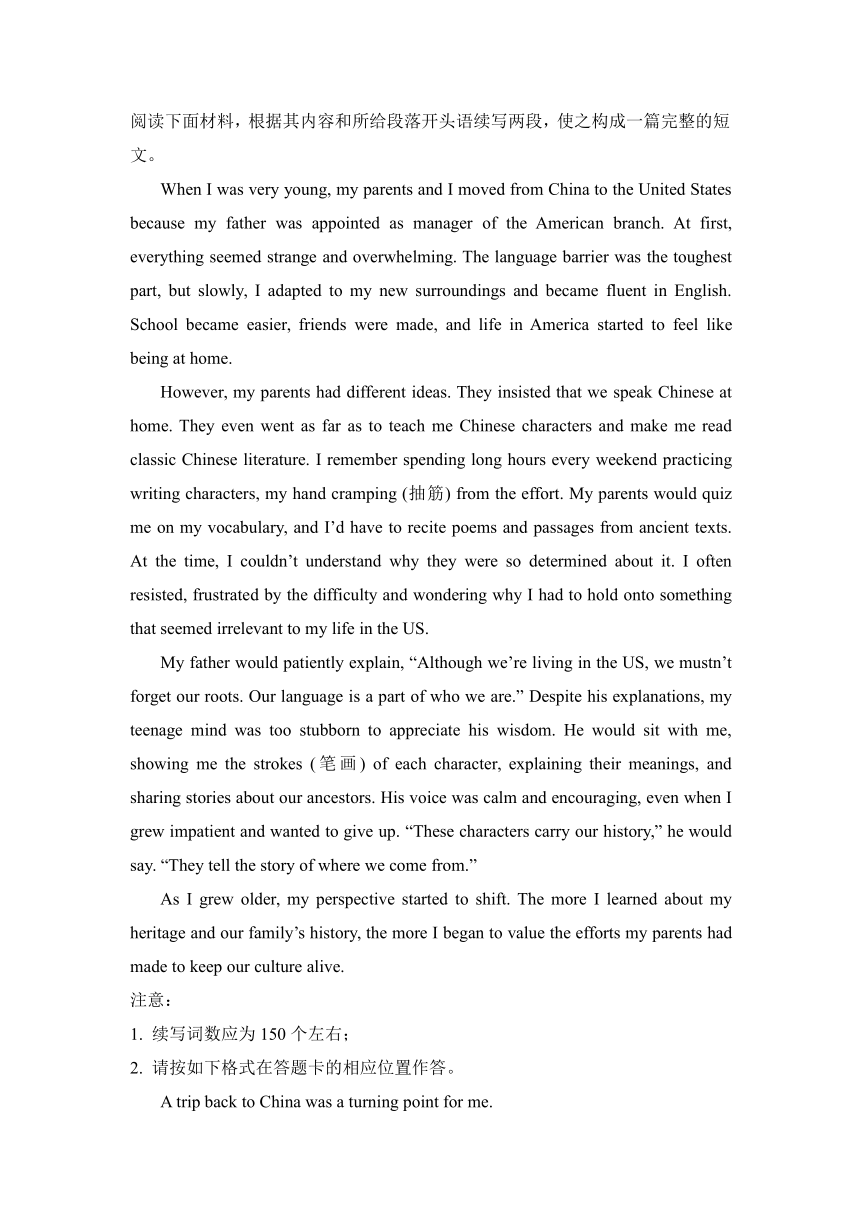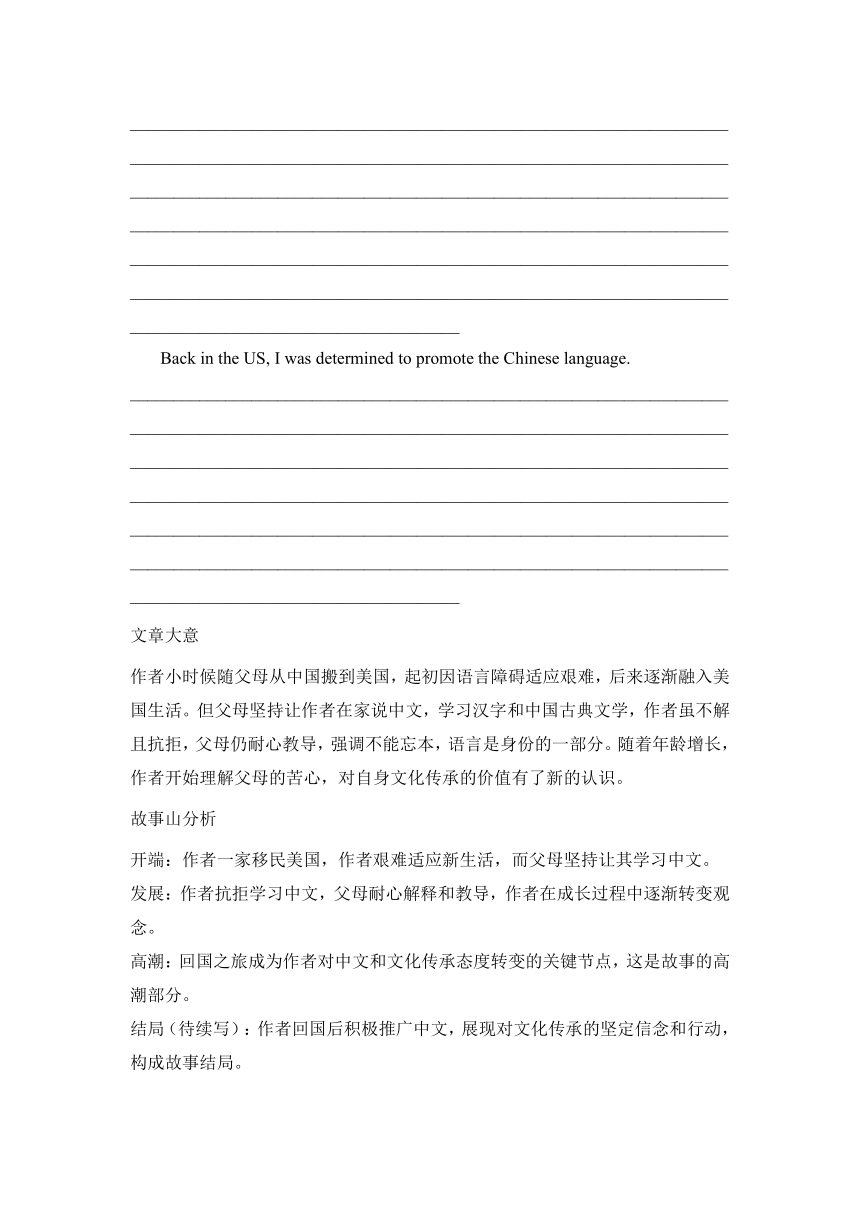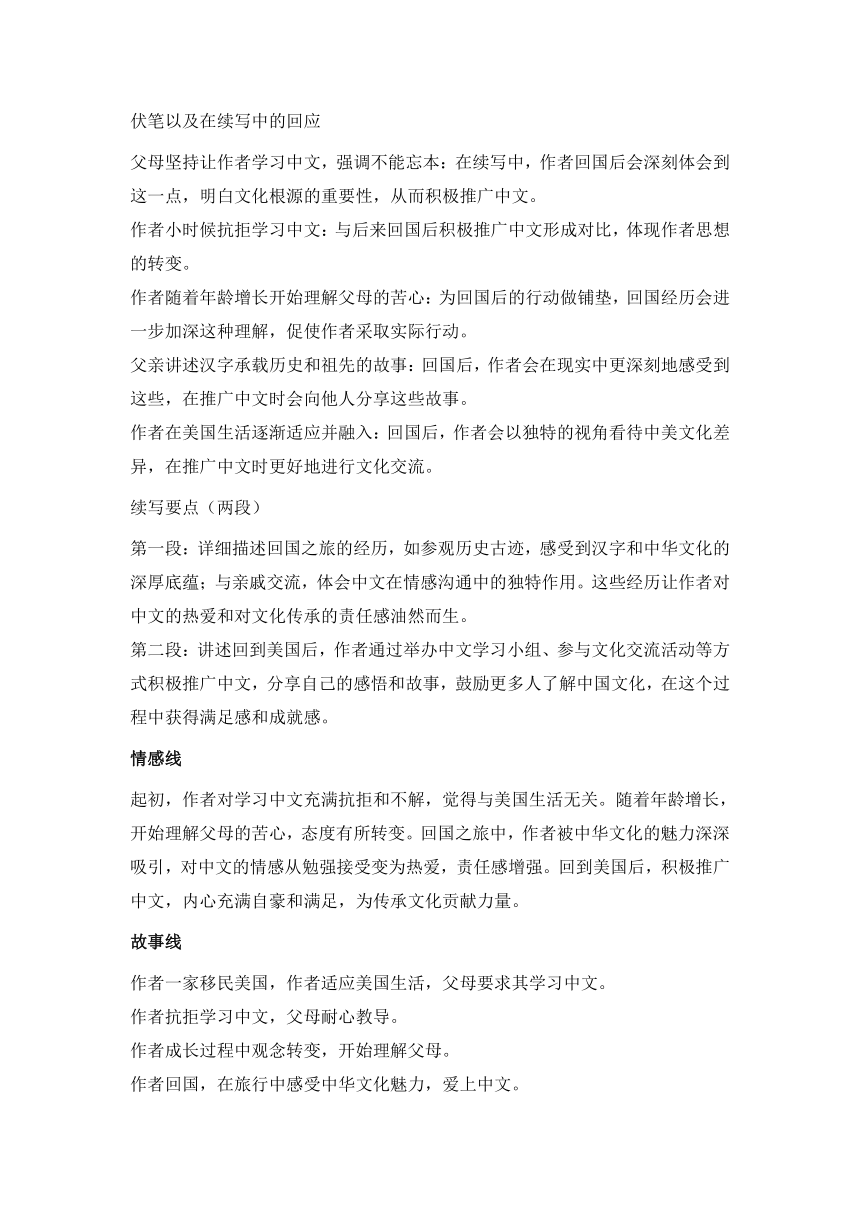读后续写 从抗拒到传承:一个华裔少年的文化寻根之旅 讲义 河北省邢台市2024-2025学年高二上学期期末英语测试试题
文档属性
| 名称 | 读后续写 从抗拒到传承:一个华裔少年的文化寻根之旅 讲义 河北省邢台市2024-2025学年高二上学期期末英语测试试题 |  | |
| 格式 | docx | ||
| 文件大小 | 22.4KB | ||
| 资源类型 | 教案 | ||
| 版本资源 | 人教版(2019) | ||
| 科目 | 英语 | ||
| 更新时间 | 2025-01-29 16:47:53 | ||
图片预览



文档简介
阅读下面材料,根据其内容和所给段落开头语续写两段,使之构成一篇完整的短文。
When I was very young, my parents and I moved from China to the United States because my father was appointed as manager of the American branch. At first, everything seemed strange and overwhelming. The language barrier was the toughest part, but slowly, I adapted to my new surroundings and became fluent in English. School became easier, friends were made, and life in America started to feel like being at home.
However, my parents had different ideas. They insisted that we speak Chinese at home. They even went as far as to teach me Chinese characters and make me read classic Chinese literature. I remember spending long hours every weekend practicing writing characters, my hand cramping (抽筋) from the effort. My parents would quiz me on my vocabulary, and I’d have to recite poems and passages from ancient texts. At the time, I couldn’t understand why they were so determined about it. I often resisted, frustrated by the difficulty and wondering why I had to hold onto something that seemed irrelevant to my life in the US.
My father would patiently explain, “Although we’re living in the US, we mustn’t forget our roots. Our language is a part of who we are.” Despite his explanations, my teenage mind was too stubborn to appreciate his wisdom. He would sit with me, showing me the strokes (笔画) of each character, explaining their meanings, and sharing stories about our ancestors. His voice was calm and encouraging, even when I grew impatient and wanted to give up. “These characters carry our history,” he would say. “They tell the story of where we come from.”
As I grew older, my perspective started to shift. The more I learned about my heritage and our family’s history, the more I began to value the efforts my parents had made to keep our culture alive.
注意:
1. 续写词数应为150个左右;
2. 请按如下格式在答题卡的相应位置作答。
A trip back to China was a turning point for me.
____________________________________________________________________________________________________________________________________________________________________________________________________________________________________________________________________________________________________________________________________________________________________________________________________________________________________________________________________
Back in the US, I was determined to promote the Chinese language.
____________________________________________________________________________________________________________________________________________________________________________________________________________________________________________________________________________________________________________________________________________________________________________________________________________________________________________________________________
文章大意
作者小时候随父母从中国搬到美国,起初因语言障碍适应艰难,后来逐渐融入美国生活。但父母坚持让作者在家说中文,学习汉字和中国古典文学,作者虽不解且抗拒,父母仍耐心教导,强调不能忘本,语言是身份的一部分。随着年龄增长,作者开始理解父母的苦心,对自身文化传承的价值有了新的认识。
故事山分析
开端:作者一家移民美国,作者艰难适应新生活,而父母坚持让其学习中文。
发展:作者抗拒学习中文,父母耐心解释和教导,作者在成长过程中逐渐转变观念。
高潮:回国之旅成为作者对中文和文化传承态度转变的关键节点,这是故事的高潮部分。
结局(待续写):作者回国后积极推广中文,展现对文化传承的坚定信念和行动,构成故事结局。
伏笔以及在续写中的回应
父母坚持让作者学习中文,强调不能忘本:在续写中,作者回国后会深刻体会到这一点,明白文化根源的重要性,从而积极推广中文。
作者小时候抗拒学习中文:与后来回国后积极推广中文形成对比,体现作者思想的转变。
作者随着年龄增长开始理解父母的苦心:为回国后的行动做铺垫,回国经历会进一步加深这种理解,促使作者采取实际行动。
父亲讲述汉字承载历史和祖先的故事:回国后,作者会在现实中更深刻地感受到这些,在推广中文时会向他人分享这些故事。
作者在美国生活逐渐适应并融入:回国后,作者会以独特的视角看待中美文化差异,在推广中文时更好地进行文化交流。
续写要点(两段)
第一段:详细描述回国之旅的经历,如参观历史古迹,感受到汉字和中华文化的深厚底蕴;与亲戚交流,体会中文在情感沟通中的独特作用。这些经历让作者对中文的热爱和对文化传承的责任感油然而生。
第二段:讲述回到美国后,作者通过举办中文学习小组、参与文化交流活动等方式积极推广中文,分享自己的感悟和故事,鼓励更多人了解中国文化,在这个过程中获得满足感和成就感。
情感线
起初,作者对学习中文充满抗拒和不解,觉得与美国生活无关。随着年龄增长,开始理解父母的苦心,态度有所转变。回国之旅中,作者被中华文化的魅力深深吸引,对中文的情感从勉强接受变为热爱,责任感增强。回到美国后,积极推广中文,内心充满自豪和满足,为传承文化贡献力量。
故事线
作者一家移民美国,作者适应美国生活,父母要求其学习中文。
作者抗拒学习中文,父母耐心教导。
作者成长过程中观念转变,开始理解父母。
作者回国,在旅行中感受中华文化魅力,爱上中文。
作者回到美国,决心推广中文。
作者通过行动推广中文,实现文化传承。
主旨升华句
This journey of cultural discovery not only deepened my connection with my roots but also inspired me to be a bridge between cultures, fostering understanding and appreciation for the rich heritage that binds us all.(这次文化探索之旅不仅加深了我与根源的联系,还激励我成为文化之间的桥梁,促进对将我们紧密相连的丰富文化遗产的理解与欣赏。)
The realization of the value of my native language and culture has made me aware that cultural inheritance is not a burden but a precious gift, one that we should pass on with pride and enthusiasm.(对母语和文化价值的认识让我明白,文化传承不是负担,而是一份珍贵的礼物,我们应自豪且热情地将其传承下去。)
By promoting the Chinese language in the US, I hope to break down cultural barriers and show the world the beauty and wisdom hidden within every Chinese character, contributing to a more diverse and inclusive global community.(通过在美国推广中文,我希望打破文化壁垒,向世界展示每个汉字背后隐藏的美丽与智慧,为构建一个更加多元包容的全球社区贡献力量。)
My experience has taught me that our cultural identity is not defined by where we live but by the values, traditions, and language we carry in our hearts, and it is our responsibility to preserve and share them.(我的经历让我明白,我们的文化身份不是由居住地点决定,而是由我们心中承载的价值观、传统和语言决定,我们有责任保护并分享它们。)
The journey of embracing my cultural heritage has transformed me from a reluctant learner to an eager advocate, and I am committed to ensuring that the light of Chinese culture shines brightly in every corner of the world.(拥抱文化传承的旅程将我从一个不情愿的学习者转变为一个热切的倡导者,我致力于让中国文化之光在世界的每个角落闪耀。)
写作示范一
A trip back to China was a turning point for me. As soon as I stepped off the plane, I was greeted by the unique hustle - bustle of Chinese cities. Visiting the Forbidden City, I was in awe of the ancient architecture and the stories engraved in every brick and stone. When chatting with my relatives in Chinese, I realized how warm and natural the language felt. Words that once seemed like a chore to learn now flowed effortlessly, carrying deep emotions. I devoured classic novels in Chinese, understanding the profound wisdom they held. This trip made me fall in love with Chinese culture all over again.
Back in the US, I was determined to promote the Chinese language. I started a Chinese - learning club at school, where students gathered to learn basic characters, simple phrases, and even ancient poems. I shared the stories behind the characters and the beauty of Chinese literature. Many students showed great interest and were eager to learn more. Through these activities, I not only spread the charm of the Chinese language but also deepened my own understanding and love for it.
写作示范二
A trip back to China was a turning point for me. Wandering through the narrow alleys of an ancient town, I was surrounded by the rich aroma of traditional Chinese cuisine and the sound of locals chatting in their native dialect. I visited a calligraphy studio and watched in amazement as the master effortlessly created beautiful characters with a brush. Inspired, I picked up a brush myself and tried. In that moment, I felt a strong connection to my ancestors. The more I explored, the more I realized how much I had missed. The language was not just a means of communication but a living testament to our long - standing history.
Back in the US, I was determined to promote the Chinese language. I organized cultural exchange events at local community centers, inviting Chinese immigrants to share their experiences and introduce Chinese culture. I also created online courses teaching basic Chinese language and culture, attracting learners from all over. Every time I saw someone's eyes light up when they learned a new character or understood a Chinese idiom, I knew my efforts were paying off. I was proud to be a part of spreading this magnificent language and culture.
【答案】One possible version:
A trip back to China was a turning point for me. Seeing the rapid development and modernization of the country filled me with pride. The towering skyscrapers of Shanghai, the busy streets of Beijing, and the high-speed train that ran through the countryside were all wonderful to witness. Being able to speak Chinese fluently made this trip even more special. I felt a strong connection to the land and its people, and the pride of my heritage grew within me. This experience reshaped my identity, combining my Chinese roots with my American life.
Back in the US, I was determined to promote the Chinese language. Inspired by my trip, I started a Chinese culture club at school, where students could learn about Chinese traditions, history, and language. I organized cultural events, like Chinese New Year celebrations and writing workshops, which attracted a diverse group of students. My efforts were met with enthusiasm, and the club grew rapidly. Through these activities, I aimed to create a sense of appreciation and respect for Chinese culture, ensuring that it remained a lively part of our multicultural society.
When I was very young, my parents and I moved from China to the United States because my father was appointed as manager of the American branch. At first, everything seemed strange and overwhelming. The language barrier was the toughest part, but slowly, I adapted to my new surroundings and became fluent in English. School became easier, friends were made, and life in America started to feel like being at home.
However, my parents had different ideas. They insisted that we speak Chinese at home. They even went as far as to teach me Chinese characters and make me read classic Chinese literature. I remember spending long hours every weekend practicing writing characters, my hand cramping (抽筋) from the effort. My parents would quiz me on my vocabulary, and I’d have to recite poems and passages from ancient texts. At the time, I couldn’t understand why they were so determined about it. I often resisted, frustrated by the difficulty and wondering why I had to hold onto something that seemed irrelevant to my life in the US.
My father would patiently explain, “Although we’re living in the US, we mustn’t forget our roots. Our language is a part of who we are.” Despite his explanations, my teenage mind was too stubborn to appreciate his wisdom. He would sit with me, showing me the strokes (笔画) of each character, explaining their meanings, and sharing stories about our ancestors. His voice was calm and encouraging, even when I grew impatient and wanted to give up. “These characters carry our history,” he would say. “They tell the story of where we come from.”
As I grew older, my perspective started to shift. The more I learned about my heritage and our family’s history, the more I began to value the efforts my parents had made to keep our culture alive.
注意:
1. 续写词数应为150个左右;
2. 请按如下格式在答题卡的相应位置作答。
A trip back to China was a turning point for me.
____________________________________________________________________________________________________________________________________________________________________________________________________________________________________________________________________________________________________________________________________________________________________________________________________________________________________________________________________
Back in the US, I was determined to promote the Chinese language.
____________________________________________________________________________________________________________________________________________________________________________________________________________________________________________________________________________________________________________________________________________________________________________________________________________________________________________________________________
文章大意
作者小时候随父母从中国搬到美国,起初因语言障碍适应艰难,后来逐渐融入美国生活。但父母坚持让作者在家说中文,学习汉字和中国古典文学,作者虽不解且抗拒,父母仍耐心教导,强调不能忘本,语言是身份的一部分。随着年龄增长,作者开始理解父母的苦心,对自身文化传承的价值有了新的认识。
故事山分析
开端:作者一家移民美国,作者艰难适应新生活,而父母坚持让其学习中文。
发展:作者抗拒学习中文,父母耐心解释和教导,作者在成长过程中逐渐转变观念。
高潮:回国之旅成为作者对中文和文化传承态度转变的关键节点,这是故事的高潮部分。
结局(待续写):作者回国后积极推广中文,展现对文化传承的坚定信念和行动,构成故事结局。
伏笔以及在续写中的回应
父母坚持让作者学习中文,强调不能忘本:在续写中,作者回国后会深刻体会到这一点,明白文化根源的重要性,从而积极推广中文。
作者小时候抗拒学习中文:与后来回国后积极推广中文形成对比,体现作者思想的转变。
作者随着年龄增长开始理解父母的苦心:为回国后的行动做铺垫,回国经历会进一步加深这种理解,促使作者采取实际行动。
父亲讲述汉字承载历史和祖先的故事:回国后,作者会在现实中更深刻地感受到这些,在推广中文时会向他人分享这些故事。
作者在美国生活逐渐适应并融入:回国后,作者会以独特的视角看待中美文化差异,在推广中文时更好地进行文化交流。
续写要点(两段)
第一段:详细描述回国之旅的经历,如参观历史古迹,感受到汉字和中华文化的深厚底蕴;与亲戚交流,体会中文在情感沟通中的独特作用。这些经历让作者对中文的热爱和对文化传承的责任感油然而生。
第二段:讲述回到美国后,作者通过举办中文学习小组、参与文化交流活动等方式积极推广中文,分享自己的感悟和故事,鼓励更多人了解中国文化,在这个过程中获得满足感和成就感。
情感线
起初,作者对学习中文充满抗拒和不解,觉得与美国生活无关。随着年龄增长,开始理解父母的苦心,态度有所转变。回国之旅中,作者被中华文化的魅力深深吸引,对中文的情感从勉强接受变为热爱,责任感增强。回到美国后,积极推广中文,内心充满自豪和满足,为传承文化贡献力量。
故事线
作者一家移民美国,作者适应美国生活,父母要求其学习中文。
作者抗拒学习中文,父母耐心教导。
作者成长过程中观念转变,开始理解父母。
作者回国,在旅行中感受中华文化魅力,爱上中文。
作者回到美国,决心推广中文。
作者通过行动推广中文,实现文化传承。
主旨升华句
This journey of cultural discovery not only deepened my connection with my roots but also inspired me to be a bridge between cultures, fostering understanding and appreciation for the rich heritage that binds us all.(这次文化探索之旅不仅加深了我与根源的联系,还激励我成为文化之间的桥梁,促进对将我们紧密相连的丰富文化遗产的理解与欣赏。)
The realization of the value of my native language and culture has made me aware that cultural inheritance is not a burden but a precious gift, one that we should pass on with pride and enthusiasm.(对母语和文化价值的认识让我明白,文化传承不是负担,而是一份珍贵的礼物,我们应自豪且热情地将其传承下去。)
By promoting the Chinese language in the US, I hope to break down cultural barriers and show the world the beauty and wisdom hidden within every Chinese character, contributing to a more diverse and inclusive global community.(通过在美国推广中文,我希望打破文化壁垒,向世界展示每个汉字背后隐藏的美丽与智慧,为构建一个更加多元包容的全球社区贡献力量。)
My experience has taught me that our cultural identity is not defined by where we live but by the values, traditions, and language we carry in our hearts, and it is our responsibility to preserve and share them.(我的经历让我明白,我们的文化身份不是由居住地点决定,而是由我们心中承载的价值观、传统和语言决定,我们有责任保护并分享它们。)
The journey of embracing my cultural heritage has transformed me from a reluctant learner to an eager advocate, and I am committed to ensuring that the light of Chinese culture shines brightly in every corner of the world.(拥抱文化传承的旅程将我从一个不情愿的学习者转变为一个热切的倡导者,我致力于让中国文化之光在世界的每个角落闪耀。)
写作示范一
A trip back to China was a turning point for me. As soon as I stepped off the plane, I was greeted by the unique hustle - bustle of Chinese cities. Visiting the Forbidden City, I was in awe of the ancient architecture and the stories engraved in every brick and stone. When chatting with my relatives in Chinese, I realized how warm and natural the language felt. Words that once seemed like a chore to learn now flowed effortlessly, carrying deep emotions. I devoured classic novels in Chinese, understanding the profound wisdom they held. This trip made me fall in love with Chinese culture all over again.
Back in the US, I was determined to promote the Chinese language. I started a Chinese - learning club at school, where students gathered to learn basic characters, simple phrases, and even ancient poems. I shared the stories behind the characters and the beauty of Chinese literature. Many students showed great interest and were eager to learn more. Through these activities, I not only spread the charm of the Chinese language but also deepened my own understanding and love for it.
写作示范二
A trip back to China was a turning point for me. Wandering through the narrow alleys of an ancient town, I was surrounded by the rich aroma of traditional Chinese cuisine and the sound of locals chatting in their native dialect. I visited a calligraphy studio and watched in amazement as the master effortlessly created beautiful characters with a brush. Inspired, I picked up a brush myself and tried. In that moment, I felt a strong connection to my ancestors. The more I explored, the more I realized how much I had missed. The language was not just a means of communication but a living testament to our long - standing history.
Back in the US, I was determined to promote the Chinese language. I organized cultural exchange events at local community centers, inviting Chinese immigrants to share their experiences and introduce Chinese culture. I also created online courses teaching basic Chinese language and culture, attracting learners from all over. Every time I saw someone's eyes light up when they learned a new character or understood a Chinese idiom, I knew my efforts were paying off. I was proud to be a part of spreading this magnificent language and culture.
【答案】One possible version:
A trip back to China was a turning point for me. Seeing the rapid development and modernization of the country filled me with pride. The towering skyscrapers of Shanghai, the busy streets of Beijing, and the high-speed train that ran through the countryside were all wonderful to witness. Being able to speak Chinese fluently made this trip even more special. I felt a strong connection to the land and its people, and the pride of my heritage grew within me. This experience reshaped my identity, combining my Chinese roots with my American life.
Back in the US, I was determined to promote the Chinese language. Inspired by my trip, I started a Chinese culture club at school, where students could learn about Chinese traditions, history, and language. I organized cultural events, like Chinese New Year celebrations and writing workshops, which attracted a diverse group of students. My efforts were met with enthusiasm, and the club grew rapidly. Through these activities, I aimed to create a sense of appreciation and respect for Chinese culture, ensuring that it remained a lively part of our multicultural society.
同课章节目录
